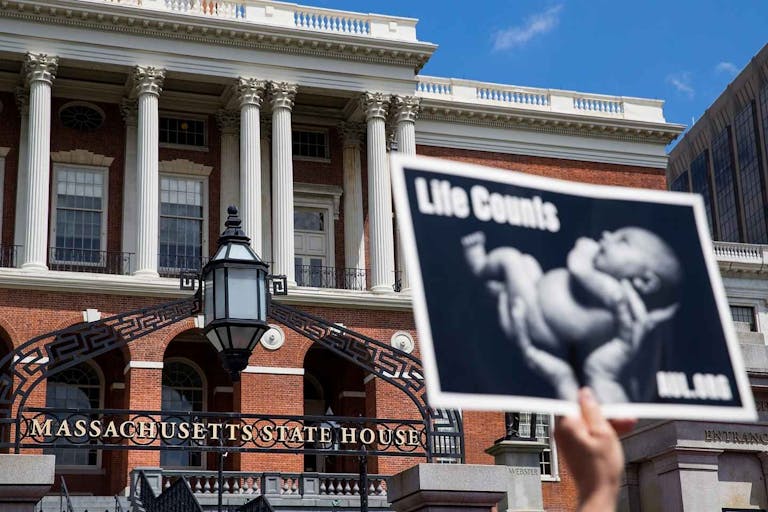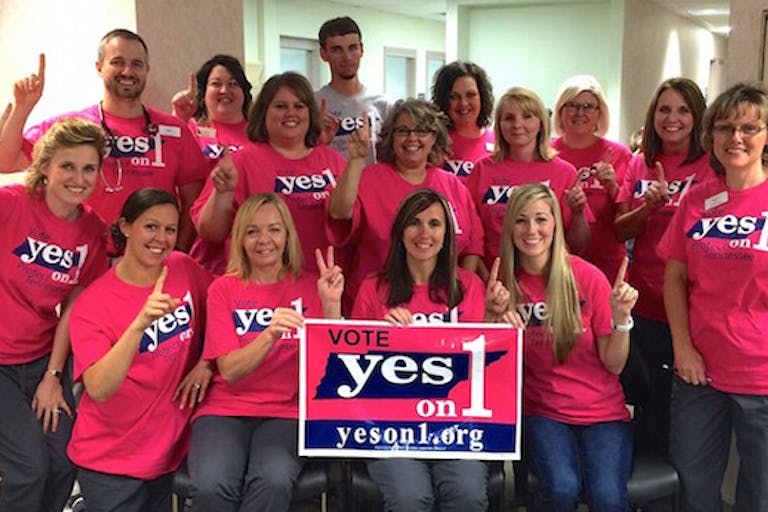
Massachusetts Health Department wants primary care to include abortion
Cassy Cooke
·
Tennessee’s pro-life Amendment 1 stands after Supreme Court rejects challenge
In a victory for pro-lifers this week, the U.S. Supreme Court declined to hear a challenge to Tennessee’s Amendment 1; therefore, it will be allowed to stand. The amendment, approved by voters in a 2014 ballot measure, “clarified that the state Constitution contains no right to abortion,” as Live Action News’ Calvin Freiburger previously reported.
The Amendment was a long time coming, finding its start in 2000 after Planned Parenthood of Middle Tennessee and the ACLU challenged a state law and won — one provision required second trimester abortions to be done in hospitals, and one required a 48-hour waiting period with “in-person counseling by physicians giving state-mandated information.” At the time, however, The Tennesseean notes that the ruling “went even further, holding that the Tennessee Constitution provided an independent right to privacy and greater protections for reproductive rights than the United States Constitution.” (A second trimester abortion is shown in the video below.)

However, this doesn’t mean that there have been no challenges to pro-life laws in the state. According to the Tennessean, a 48-hour waiting period, enacted by the Legislature in 2015, is still being challenged in court. In addition:
Last year, Tennessee’s attorney general, state Department of Health officials and the Tennessee Board of Medical Examiners agreed to permanently stop enforcing two abortion measures….
… a 2012 Tennessee law requiring doctors performing abortions in Tennessee to obtain admitting privileges at a local hospital and a 2014 law requiring abortion clinics providing 50 or more surgical abortions annually to meet the requirements of ambulatory surgical care centers….
Article continues below
Dear Reader,
In 2026, Live Action is heading straight where the battle is fiercest: college campuses.
We have a bold initiative to establish 100 Live Action campus chapters within the next year, and your partnership will make it a success!
Your support today will help train and equip young leaders, bring Live Action’s educational content into academic environments, host on-campus events and debates, and empower students to challenge the pro-abortion status quo with truth and compassion.
Invest in pro-life grassroots outreach and cultural formation with your DOUBLED year-end gift!
The laws had forced two abortion providers in Tennessee to close their doors.
READ: Gallup poll: Majority of Americans want more abortion restrictions
Many voters who approved Amendment 1 were concerned that Tennessee had become an “abortion destination” for women from surrounding states. Those eight bordering states, writes the Tennessean, “passed abortion rules and restrictions, including waiting periods and requirements on abortion clinics that forced clinic closures in those states, while Tennessee’s nine long-running abortion clinics remained open. A Tennessean analysis in 2014 found more than one in four abortions sought in Tennessee during that time were from women from out-of-state.”
And with regard to abortion, that wasn’t the only thing coming from out of state. According to Calvin Freiburger, “The amendment was enacted in 2014 despite supporters being outspent 3-1 by opponents, with most of the pro-abortion funding coming from out of state. Since its passage, lawmakers have passed multiple new pro-life laws.”
TN Right to Life president Brian Harris told the Tennessean that the decision is “a cause for great celebration,” but that pro-lifers must “continue to work for the day when every life is again protected by the laws of our state and nation.”
Live Action News is pro-life news and commentary from a pro-life perspective.
Contact editor@liveaction.org for questions, corrections, or if you are seeking permission to reprint any Live Action News content.
Guest Articles: To submit a guest article to Live Action News, email editor@liveaction.org with an attached Word document of 800-1000 words. Please also attach any photos relevant to your submission if applicable. If your submission is accepted for publication, you will be notified within three weeks. Guest articles are not compensated (see our Open License Agreement). Thank you for your interest in Live Action News!

Cassy Cooke
·
Issues
Bridget Sielicki
·
Issues
Nancy Flanders
·
Politics
Bridget Sielicki
·
Issues
Sheena Rodriguez
·
Guest Column
Right to Life UK
·
Human Interest
Kelli Keane
·
Activism
Kelli Keane
·
Politics
Kelli Keane
·
Human Interest
Kelli Keane
·
Abortion Pill
Kelli Keane
·